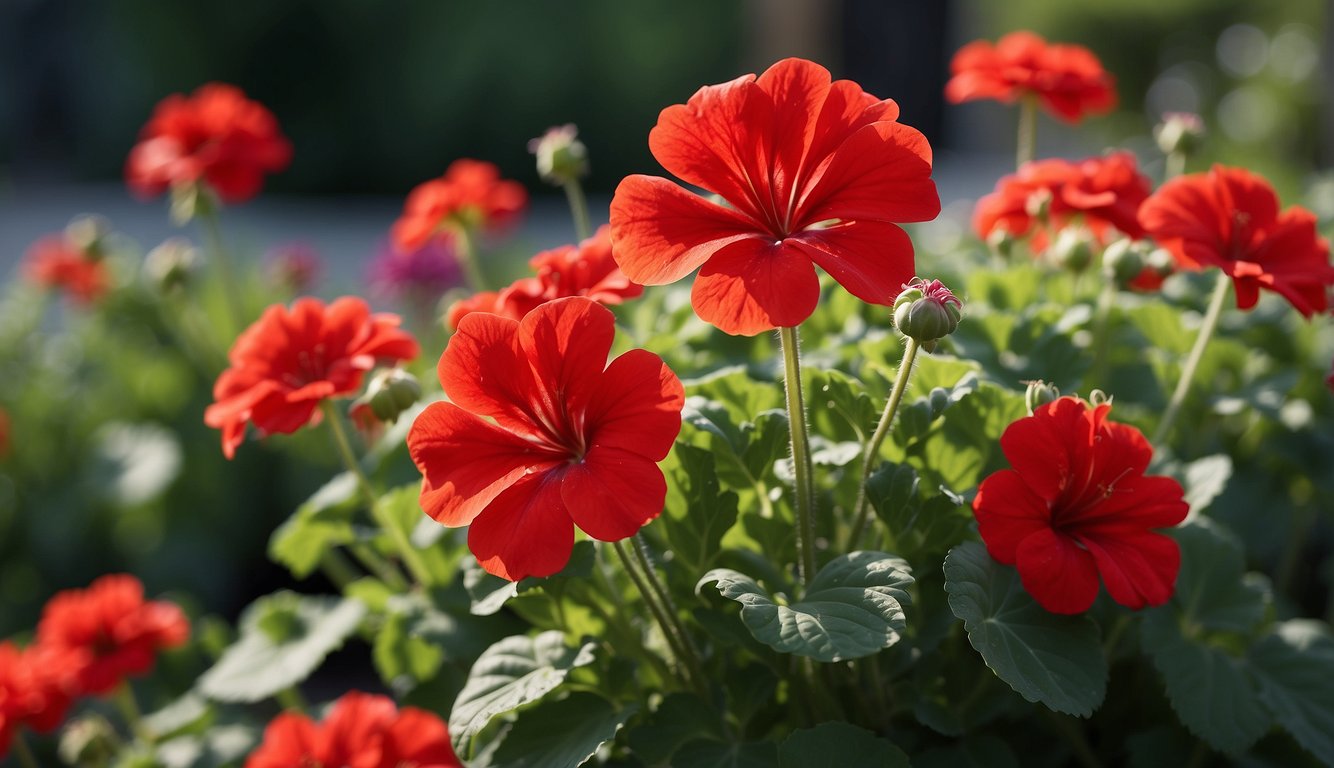TheHerbProf.com is a treasure trove of knowledge for those interested in natural healing and herbal remedies. The website is run by Paul Johnston MD. A naturopathic who has not only received extensive education in the field but also has personal experience in self-healing.
Geranium aroma is a popular scent in the world of aromatherapy and perfumery. Geranium essential oil is extracted from the leaves and flowers of the geranium plant, and it is known for its sweet, floral scent with a hint of citrus. This aroma is often used to promote emotional balance, reduce stress, and improve skin health.
Geranium aroma is a common ingredient in many skincare and haircare products due to its ability to promote healthy-looking hair and skin. It is also believed to have therapeutic benefits for women’s reproductive health, including menstrual cramps and endometriosis. Inhaling geranium essential oil’s sweet aroma can support emotions by creating a calming and grounding effect. The aroma of geranium essential oil can also help lessen feelings of stress and calm nerves.
History and Origin
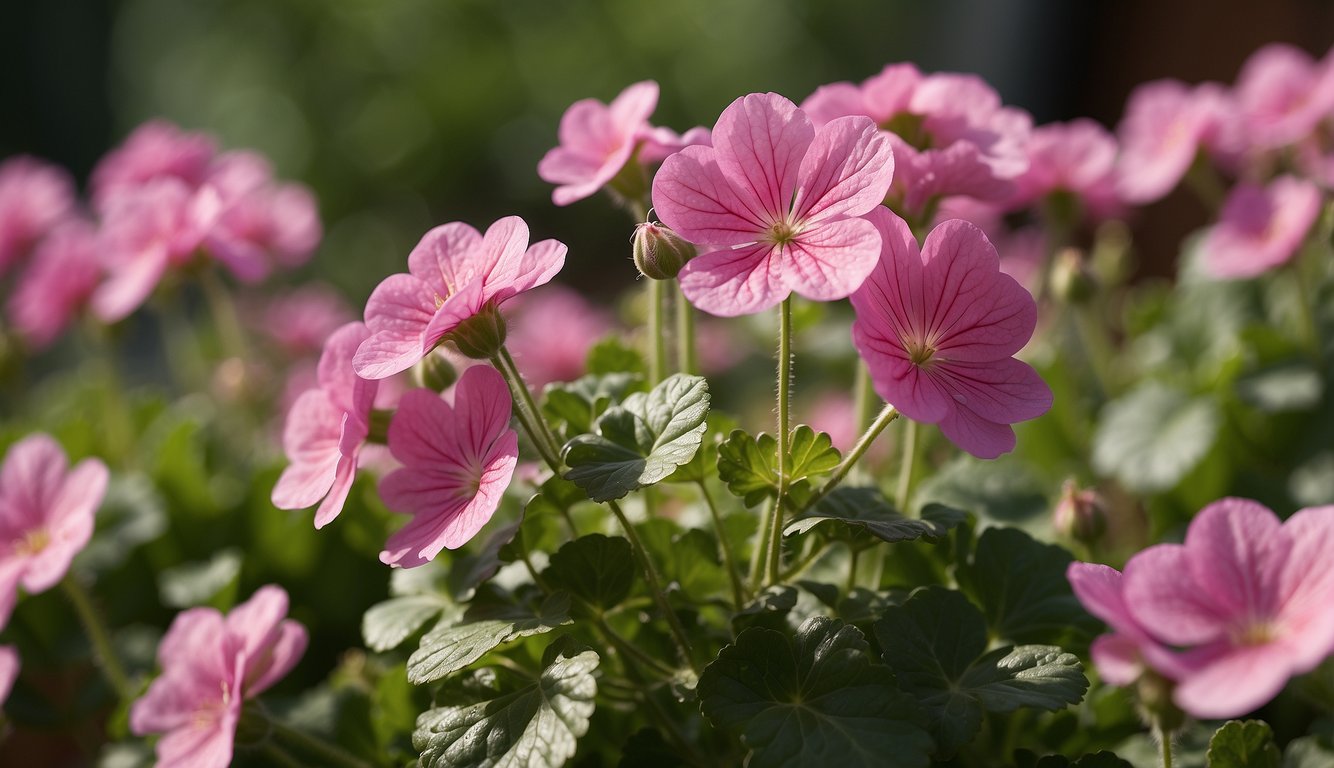
Geranium aroma has been used for centuries and has a rich history in ancient cultures. In this section, I will explore the origins of geranium and how it spread to other regions.
Geranium in Ancient Cultures
Geraniums are native to South Africa, where they have been used in traditional medicine for centuries. The plant was highly valued for its medicinal properties and was used to treat a variety of ailments, including wounds, respiratory problems, and digestive issues. It was also used in aromatherapy to promote relaxation and relieve stress.
In ancient Egypt, geraniums were used to treat skin conditions and promote healthy, glowing skin. The plant was also used in perfumes and cosmetics due to its pleasant aroma and skin-soothing properties.
Spread to Other Regions
Geraniums were brought to Europe in the 17th century and quickly gained popularity due to their beautiful flowers and pleasant aroma. The first cultivation for distillation of the essential oil was in France, and the plant was subsequently re-exported to the French colonies in Africa and elsewhere, and then more widely.
In the 19th century, geraniums were introduced to North America, where they quickly became popular as ornamental plants. Today, geraniums can be found all over the world and are grown for their beautiful flowers and their essential oil, which is used in a variety of products, including skincare, fragrances, and traditional remedies.
Overall, the history and origin of geranium aroma is fascinating and rich in culture. From its origins in South Africa to its spread throughout the world, geraniums have played an important role in traditional medicine and aromatherapy for centuries.
Botanical Profile
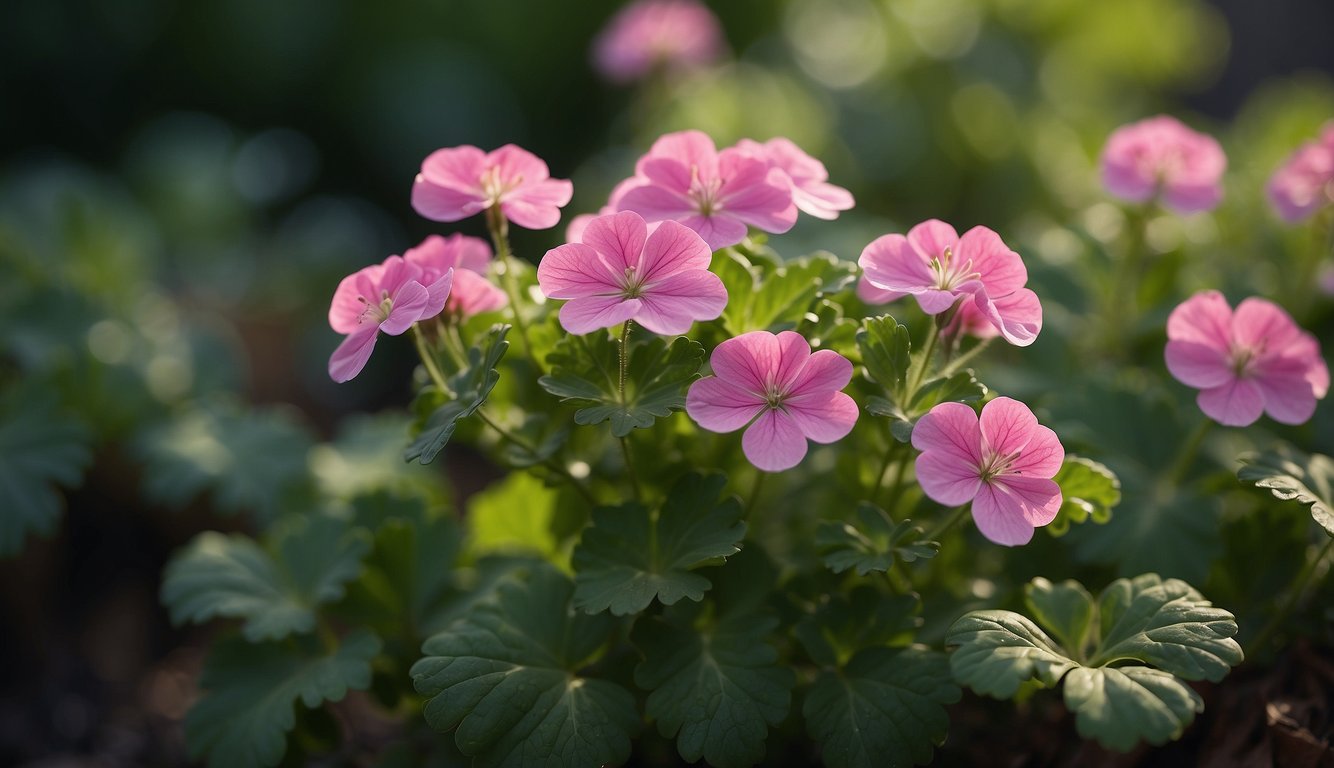
Geranium is a perennial shrub that belongs to the Pelargonium family, which is native to South Africa. There are over 200 species of Pelargonium, and the most commonly used species for essential oil production is Pelargonium graveolens. The plant grows up to three feet tall and has hairy, heart-shaped leaves with serrated edges. The flowers are small and come in a range of colors, including pink, white, and rust.
Geranium Species
The Pelargonium genus includes a variety of species, each with its own unique characteristics. Some of the most popular species include P. odoratissimum, P. tomentosum, P. sidoides, and P. citronellum. Each species has its own distinct aroma and properties, making them suitable for different applications.
Cultivation and Harvesting
Geranium is cultivated in many parts of the world, including Europe, Central America, Egypt, Russia, Japan, and the Congo. The plant prefers a warm, dry climate and well-draining soil. It is typically propagated by cuttings or seed, and it can take up to six months for the plant to reach maturity.
The leaves and flowers of the geranium plant are harvested for their essential oil content. The oil is extracted through steam distillation, which involves heating the plant material to release the oil. The resulting oil is pale yellow or green in color and has a sweet, floral aroma.
Geranium is a versatile plant with a rich history of use in traditional medicine and aromatherapy. Its unique aroma and properties make it a popular choice for a wide range of applications, from skincare to emotional support.
Extraction and Composition
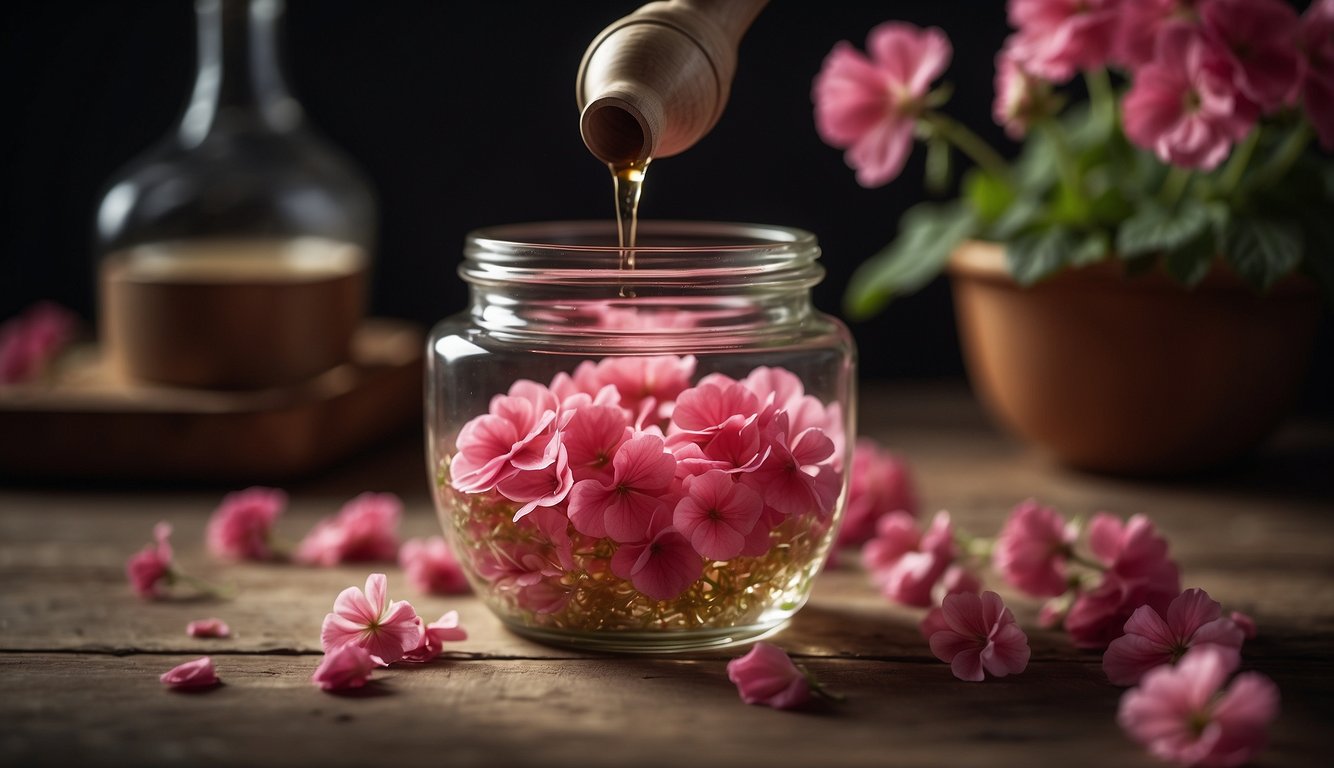
Methods of Extraction
Geranium essential oil is extracted from the leaves, stems, and flowers of the geranium plant. There are several methods of extraction, but the most common is steam distillation. During this process, steam is passed through the plant material, causing the essential oil to be released. The steam and oil are then condensed and separated, resulting in a pure essential oil.
Chemical Constituents
Geranium essential oil is composed of several chemical constituents, including citronellol, geraniol, and citronellyl formate. Citronellol is a natural acyclic monoterpenoid alcohol that gives geranium oil its rose-like aroma. Geraniol is another monoterpenoid alcohol that contributes to the floral scent of geranium oil. Citronellyl formate is an ester that adds a fruity note to the oil.
The exact chemical composition of geranium essential oil can vary depending on factors such as the plant species, growing conditions, and extraction method. However, the main constituents are typically citronellol and geraniol. In fact, high-quality geranium oil should contain at least 60% citronellol and 10% geraniol.
Overall, the chemical constituents of geranium essential oil give it a unique and pleasant aroma that is widely used in perfumes, cosmetics, and aromatherapy.
Aromatherapeutic Properties – Geranium Aroma
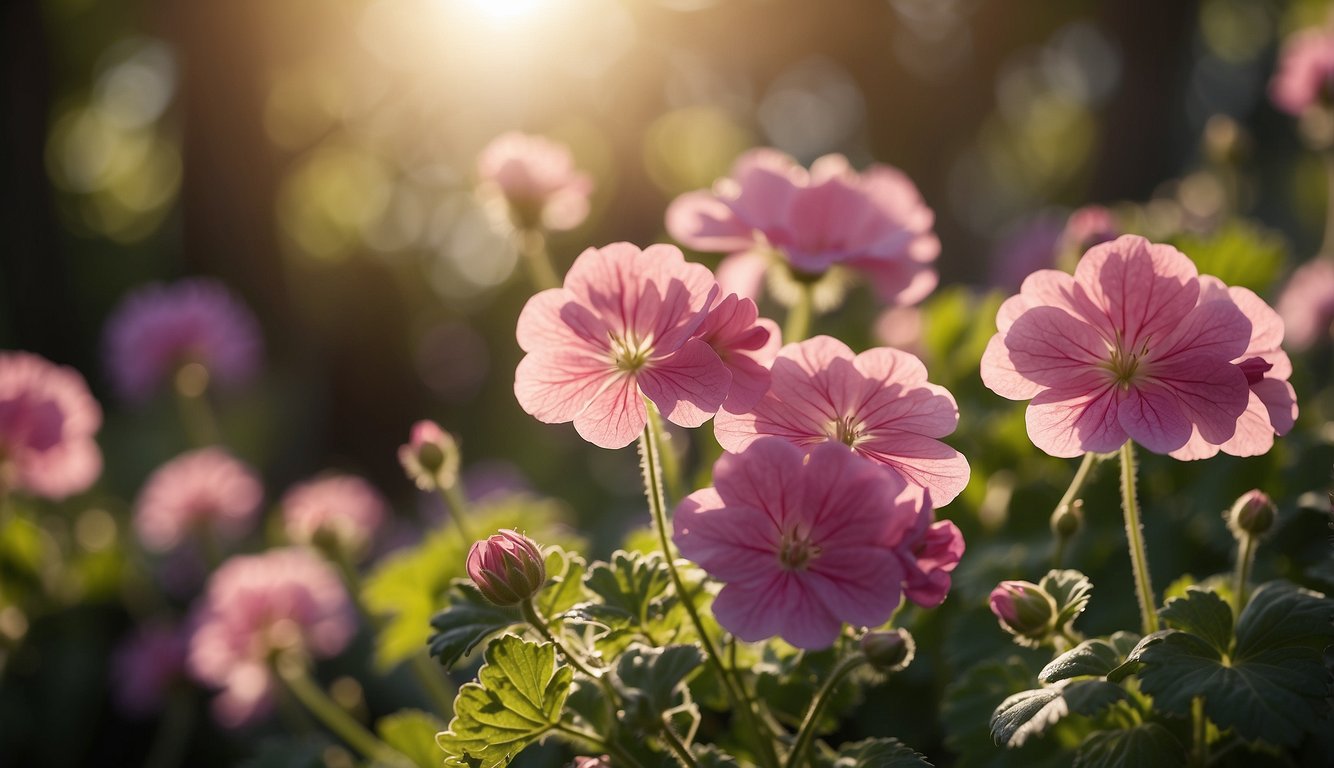
Geranium aroma oil is prized for its calming and uplifting properties, making it a popular choice for aromatherapy. The enchanting aroma of geranium oil can be used in diffusers or added to homemade body sprays, massage oils, and bath products. Geranium aroma is known to have a balancing effect on the mind and body and is believed to help reduce stress, anxiety, and depression.
Mood and Cognitive Effects – Geranium Aroma
Geranium aroma oil has been shown to have mood-enhancing effects. According to a study published in the Journal of Ethnopharmacology, geranium aroma oil can improve cognitive function and reduce anxiety in healthy adults. The study found that inhalation of geranium aroma oil significantly improved cognitive function and reduced anxiety levels in the participants.
Physical Health Benefits
Geranium aroma oil is also believed to have several physical health benefits. The oil is known to have anti-inflammatory, antimicrobial, and antibacterial properties, making it beneficial for reducing skin irritation, acne breakouts, and other skin conditions. Geranium aroma oil is also an astringent, which means it can help tighten and tone the skin, reducing the appearance of fine lines and wrinkles.
Research has also shown that geranium aroma oil may have potential health benefits for individuals with neurodegenerative diseases. A study published in the Journal of Alzheimer’s Disease found that geranium aroma oil has neuroprotective effects and may be beneficial for individuals with Alzheimer’s disease. The study found that geranium aroma oil can inhibit the formation of amyloid beta, a protein that is associated with the development of Alzheimer’s disease.
Overall, geranium aroma oil has a range of aromatherapeutic properties that can have positive effects on both the mind and body. From reducing stress and anxiety to improving cognitive function and reducing inflammation, geranium aroma oil is a versatile and beneficial essential oil that can be incorporated into a variety of wellness routines.
Geranium Oil in Skincare – Geranium Aroma
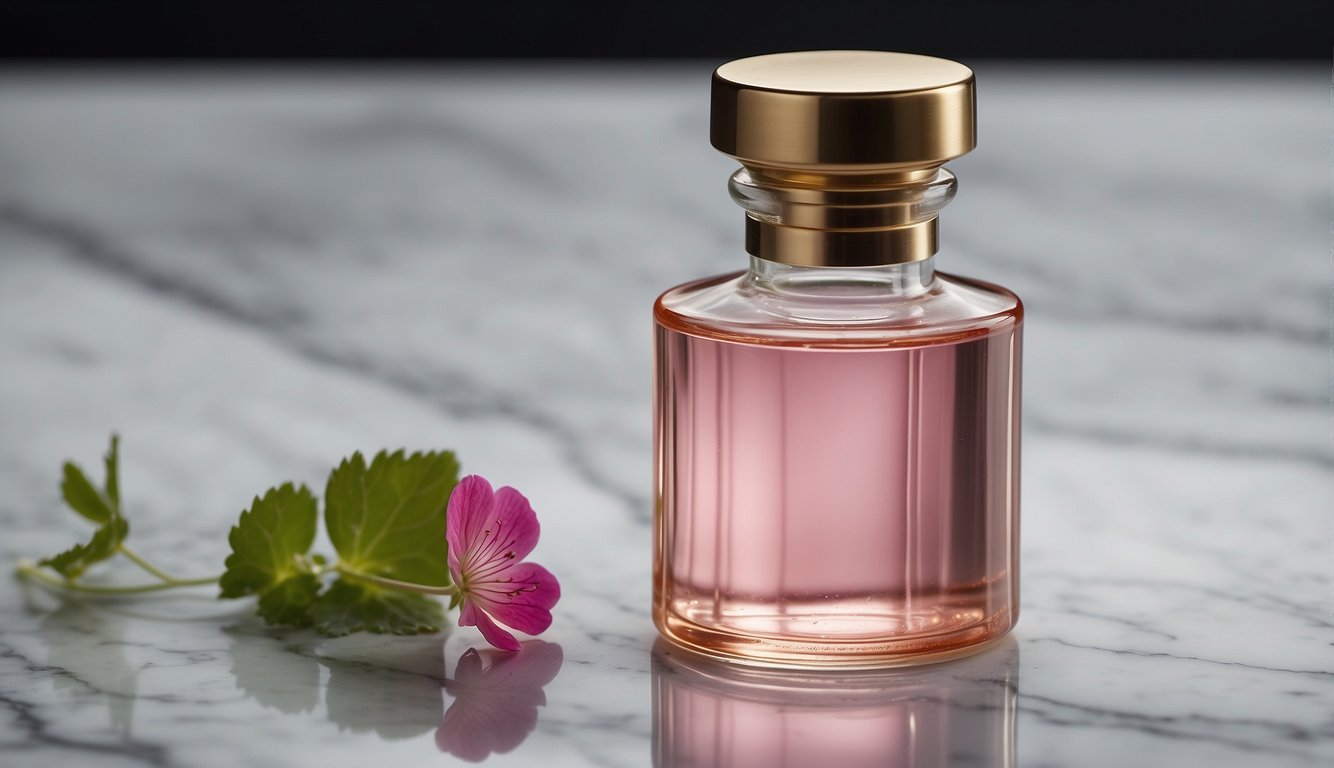
As someone who has been using essential oils for years, I can confidently say that geranium oil is a powerful tool in skincare. In this section, I will discuss the benefits of geranium oil in skincare and how to use it safely and effectively.
Skin Conditions and Treatments – Geranium Aroma
Geranium oil has been shown to be effective in treating a variety of skin conditions. It has anti-inflammatory properties that can help reduce redness and swelling associated with acne, dermatitis, and eczema. Additionally, it has antimicrobial properties that can help prevent infections in wounds and other skin injuries.
When used in skincare, geranium oil can also help balance sebum production, which can be beneficial for both oily and dry skin types. This can help reduce the appearance of fine lines and wrinkles, as well as improve overall skin texture and tone.
Application and Dilution
When using geranium oil in skincare, it is important to dilute it properly. I recommend using a carrier oil such as coconut oil or a massage oil to dilute the geranium oil before applying it to the skin. This will help prevent irritation and other adverse reactions.
To use geranium oil in skincare, simply mix a few drops of the oil with your carrier oil of choice and apply it to your skin. You can also add a few drops to your favorite moisturizer or serum for added benefits.
Overall, geranium oil is a powerful tool in skincare that can help improve a variety of skin conditions and treatments. With proper dilution and application, it can be a safe and effective addition to your skincare routine.
Usage and Blends
Geranium essential oil is a versatile oil that can be used in a variety of ways. Here are some blends and uses for geranium essential oil.
Perfumery and Fragrances – Geranium Aroma
Geranium oil has a sweet, floral scent that makes it a popular choice for perfumes and fragrances. It has a fresh and potent aroma that is both calming and relaxing. It blends well with other floral and citrus oils, such as lavender, bergamot, and lemon, to create a unique and refreshing scent.
To make your own perfume, mix a few drops of geranium oil with a carrier oil, such as jojoba or almond oil. You can also add a few drops to your bathwater for a relaxing and calming experience.
Home and Personal Care
Geranium oil can also be used in home and personal care products. It has antibacterial, antioxidant, and anti-inflammatory properties that make it a great addition to your cleaning and skincare routine.
To make a natural all-purpose cleaner, mix equal parts water and white vinegar with a few drops of geranium oil. This will not only clean your surfaces, but also leave a refreshing scent.
Geranium oil can also be added to your skincare routine. Mix a few drops with a carrier oil, such as coconut or argan oil, and apply to your skin for a calming and moisturizing effect. It can also be used in hair care products to promote healthy-looking hair.
Geranium essential oil is a versatile oil that can be used in a variety of ways. Its sweet and floral scent makes it a popular choice for perfumes and fragrances, while its antibacterial and anti-inflammatory properties make it a great addition to your cleaning and skincare routine.
Safety and Precautions – Geranium Aroma
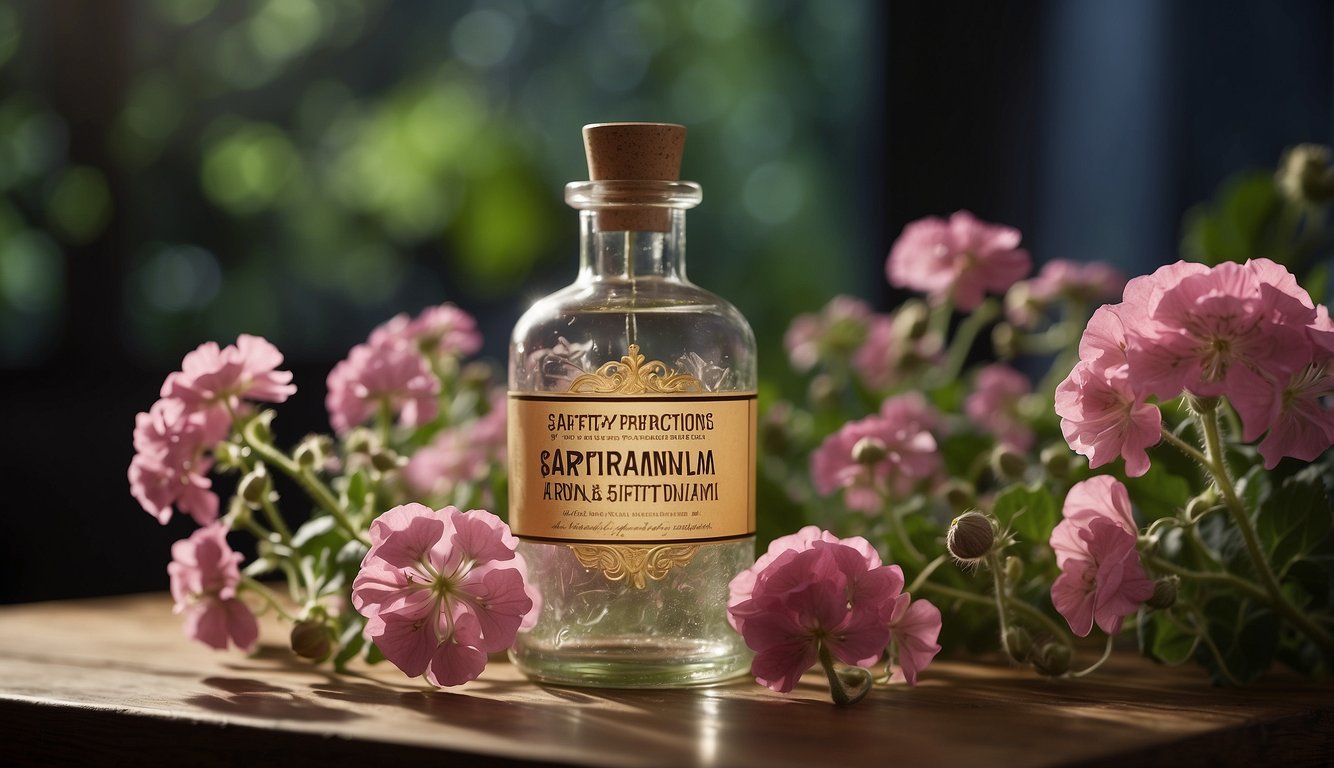
As with any essential oil, there are some safety precautions you should take when handling geranium oil. Here are some important points to keep in mind:
Contraindications – Geranium Aroma
Geranium oil is generally considered safe for most people when used properly. However, there are some contraindications to keep in mind. For example, if you are pregnant, it is recommended that you avoid using geranium oil. This is because there is some evidence to suggest that it may have an effect on hormone levels, which could potentially be harmful to a developing fetus.
Proper Handling and Storage
When handling geranium oil, it is important to take the proper precautions to avoid any adverse effects. For example, you should always dilute the oil before using it on your skin, as it can be irritating if applied directly. It is also important to store the oil in a cool, dry place, away from direct sunlight, as this can cause it to degrade over time.
Here are some additional tips for handling and storing geranium oil:
- Always use a carrier oil when applying geranium oil to your skin.
- Keep geranium oil out of the reach of children, as it can be toxic if ingested.
- If you have allergies or sensitivities, it is recommended that you perform a patch test before using geranium oil on your skin.
- If you experience any adverse effects after using geranium oil, such as skin irritation or respiratory problems, stop using it immediately and seek medical attention.
By following these precautions and handling geranium oil properly, you can enjoy its many benefits without putting yourself at risk.
Culinary Uses – Geranium Aroma
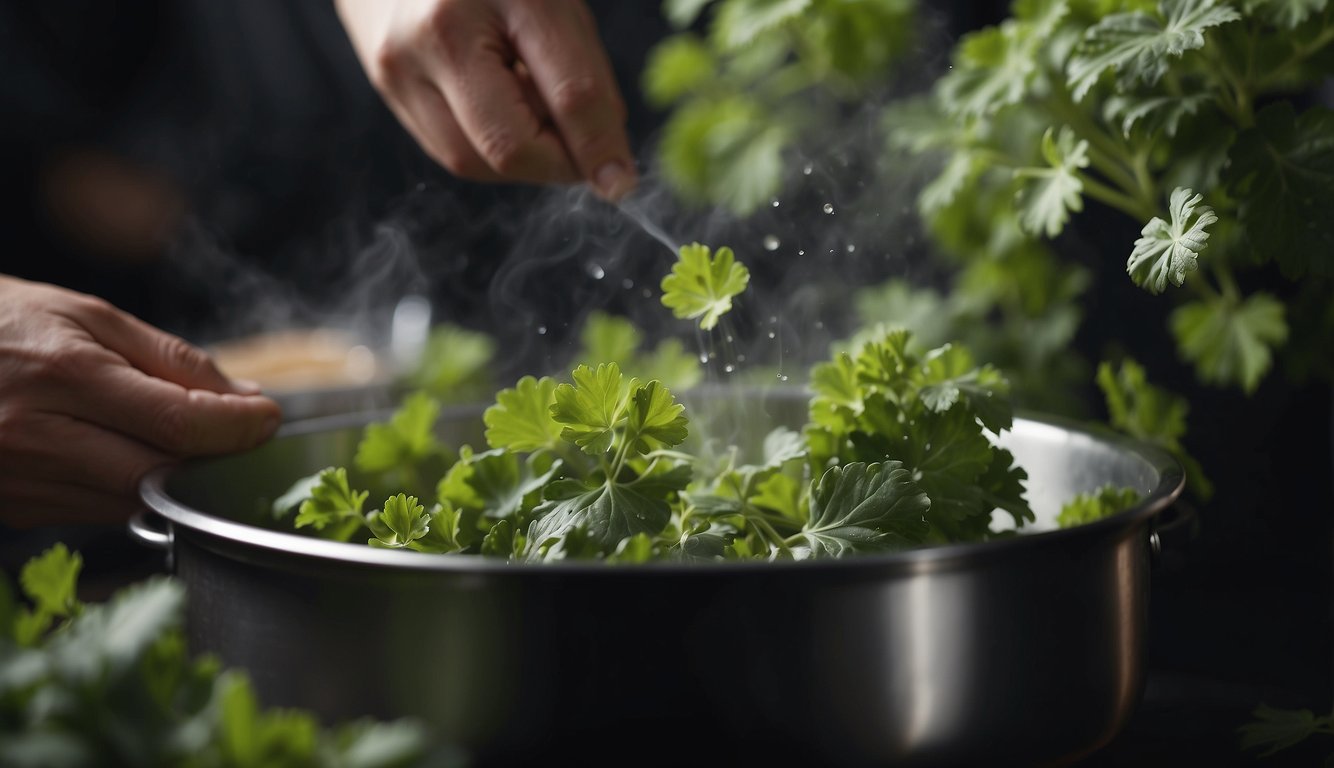
I have always been fascinated by the versatility of geraniums, and one of the most interesting ways to use them is in cooking. Here are some ideas for using geraniums in your culinary creations.
Edible Varieties
Not all geraniums are edible, so it’s important to choose the right variety. The most commonly used edible geranium is the rose geranium, which has a sweet, floral flavor that pairs well with both sweet and savory dishes. Other edible geranium varieties include lemon, mint, and bergamot, which each have their own unique flavor profiles.
Geranium in Recipes – Geranium Aroma
Geranium can be used in a variety of recipes, from sweet to savory. Here are a few ideas to get you started:
- Baked Goods: Add a few drops of geranium oil to your favorite baked goods, such as cakes, cookies, or muffins, to give them a floral twist.
- Salads: Use fresh or dried geranium leaves to add a pop of color and flavor to your salads. The lemon and mint varieties work particularly well in salads with citrus or berry dressings.
- Sauces: Add a few drops of geranium oil to your favorite sauces, such as tomato or cream sauce, to give them a unique flavor profile.
- Tea: Brew fresh or dried geranium leaves in hot water for a soothing and fragrant tea.
When using geranium in recipes, it’s important to start with a small amount and adjust to taste. Too much geranium can be overpowering, so a little goes a long way.
Geraniums are not just beautiful flowers, but also have a variety of culinary uses. Whether you are using fresh leaves or geranium oil, they can add a unique and floral flavor to your dishes.
Cultural and Symbolic Significance – Geranium Aroma

Geraniums have been a part of human culture for centuries and have been used in various ways, from medicinal to decorative purposes. In this section, I will explore the cultural and symbolic significance of geraniums.
Geraniums in Literature and Art
Geraniums have been mentioned in various literary works and have been used as a symbol in art. In William Faulkner’s novel, “A Rose for Emily,” the protagonist, Emily Grierson, is described as having a “strong, clear smell of geraniums” about her. This description adds to the eerie and mysterious tone of the novel.
In art, geraniums have been used as a symbol of love and friendship. In Victorian times, geraniums were often given as a gift to show affection and were also used to decorate homes. The famous artist, Vincent Van Gogh, painted a still life of geraniums in a vase, which is now considered a masterpiece.
Symbolism Across Cultures
Geraniums have different symbolic meanings in different cultures. In Chinese culture, geraniums are believed to bring good luck and positive energy. Now, in Egypt, geraniums were used in the embalming process and were believed to have healing properties.
In Western culture, geraniums are often associated with love and friendship. They are also used to symbolize courage and determination. Geraniums are often used in gardens and as houseplants due to their vibrant colors and pleasing aroma.
Geraniums have played an important role in human culture throughout history. From literature to art, geraniums have been used as a symbol of love, friendship, and courage. Their pleasing aroma and vibrant colors make them a popular choice for gardens and home decor.
Geranium Aroma
Today, we’re immersing ourselves in the delightful world of Geranium Aroma. Buckle up, it’s going to be a fragrant journey!
Firstly, let’s talk about Geraniums. These lovely flowers are not just a feast for the eyes, they’re also a feast for the nose. Their scent is sweet, floral, and absolutely intoxicating!
Now, the aroma part. Geranium aroma is often used in aromatherapy for its calming and uplifting properties. It’s like a spa day in a scent!
And here’s a fun fact! Geranium aroma is also used in perfumes, soaps, and lotions. It’s like carrying a garden with you, wherever you go!
So, next time you’re in need of a pick-me-up, reach for some Geranium aroma. Your senses will thank you!
For more aromatic adventures, do visit the website theherbprof.com. Keep it fragrant, folks!
References – Geranium Aroma
Little Herb Encyclopedia, by Jack Ritchason; N.D., Woodland Publishing Incorporated, 1995
The Ultimate Healing System, Course Manual, Copyright 1985, Don Lepore
Planetary Herbology, Michael Tierra, C.A., N.D., Lotus Press, 1988
Handbook of Medicinal Herbs, by James A. Duke, Pub. CRP Second Edition 2007
The Complete Medicinal Herbal, by Penelope Ody, Published by Dorling Kindersley
Check the Following Articles!
Best Organic Fertilizer for Tomatoes: Boost Your Harvest
Best Tasting Early Tomato Varieties for Your Garden
Weird Green Vegetables: Uncommon but Nutritious
Frequently Asked Questions – Geranium Aroma
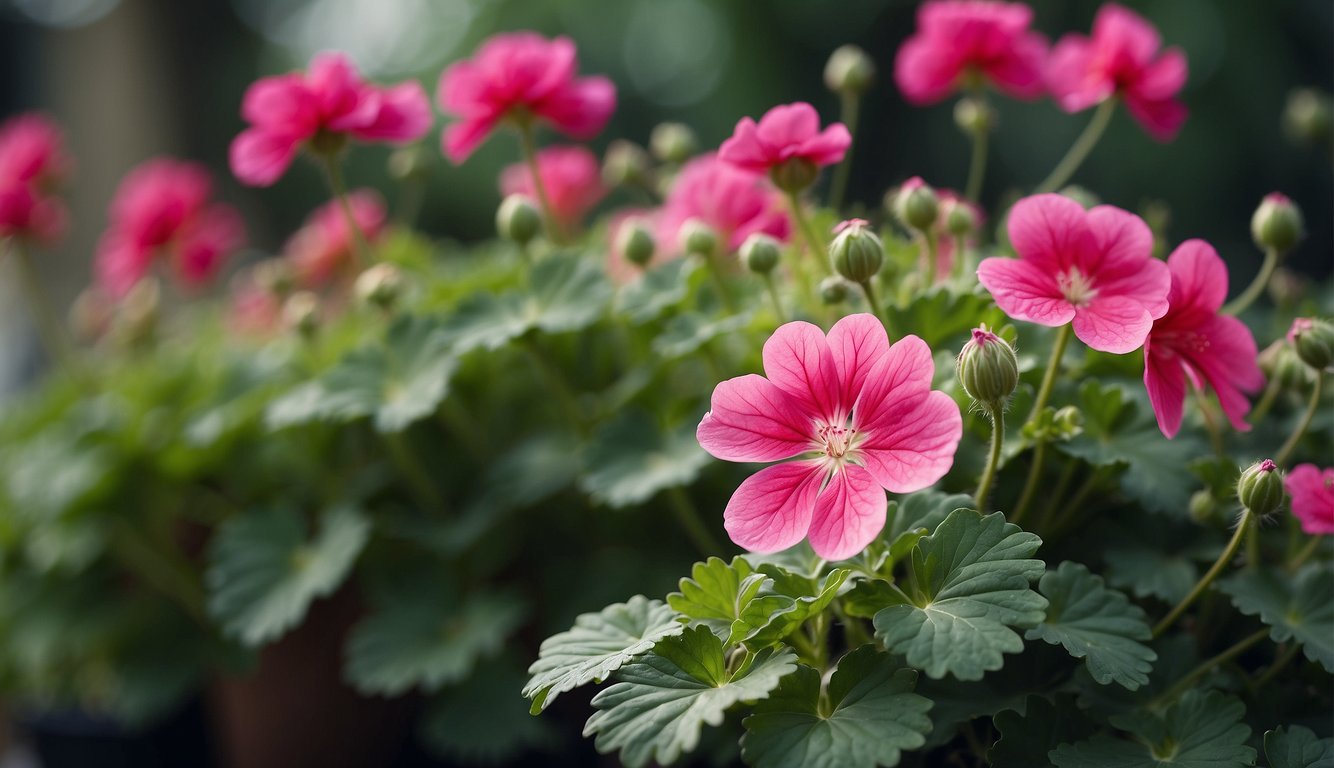
What are the benefits of using geranium aroma in daily life?
Geranium aroma has a range of benefits that make it a popular choice for daily use. The aroma is known for its calming and uplifting properties, making it ideal for use in aromatherapy practices. It can also be used to promote healthy, youthful-looking skin and hair, and has antibacterial and anti-inflammatory actions.
How can geranium aroma be used in cooking and what recipes are most popular?
Geranium aroma is a popular ingredient in many culinary recipes. It has a sweet, floral fragrance that can add a unique flavor to dishes. Some popular recipes that use geranium aroma include baked goods, jams, and jellies. It is important to note that only food-grade geranium oil should be used in cooking.
In what ways is geranium oil utilized in aromatherapy practices?
Geranium oil is commonly used in aromatherapy practices due to its calming and uplifting properties. It can be diffused or added to massage oils to promote relaxation and reduce stress. It is also used to promote healthy skin and hair.
What are the distinctive scent characteristics of geranium oil?
The scent of geranium oil is complex and composed of a variety of aromatic compounds. Its primary notes include the earthy and pungent scents of citronellol and geraniol, both derived from the essential oils contained in geranium leaves.
How does the price of geranium oil compare to other essential oils on the market?
The price of geranium oil varies depending on the quality and purity of the oil. Generally, it is more expensive than some other essential oils on the market, but it is still considered affordable.
Where can one purchase high-quality geranium aroma products?
High-quality geranium aroma products can be purchased from reputable retailers and online stores. It is important to ensure that the products are pure and free from synthetic additives. Reading product reviews and researching the company can help ensure that the product is of high quality.
